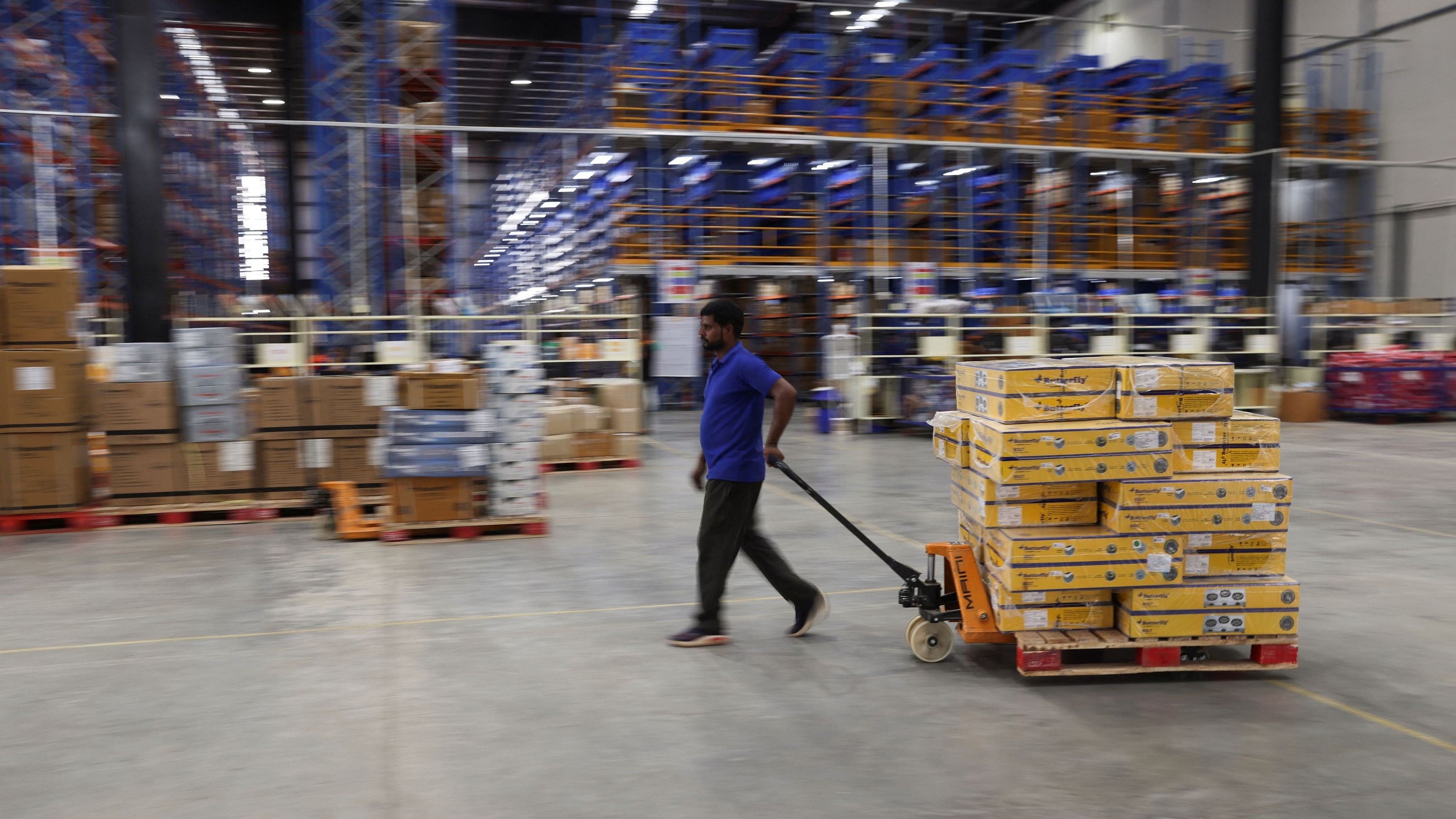
A man drags a pallet loaded with boxes at the supply management company Prozo's distribution warehouse near Gurugram, India, August 9, 2023.
Credit: Reuters Photo
Bengaluru: The hyper-shopping anticipated this festive season has propelled e-commerce-associated logistics players to invest upwards of $1 billion to prepare for the bonanza, say industry observers.
This investment is broken up with 40 per cent going into building storage space between warehousing, dark stores and fulfilment centres, 25 per cent into hiring manpower to handle the extra work, another 25 per cent into technology to improve efficiency, accuracy and enhance last-mile delivery capabilities and the remaining 10 per cent will go into marketing initiatives, estimated Aditya Shah, executive director of the logistics company - V-Trans (India) Ltd and chief executive officer of V-Xpress.
Indian e-commerce platforms are collectively expected to clock sales worth Rs 90,000 crore this festive season, an 18 per cent-20 per cent growth over the previous season, according to a recent report by Bengaluru-based Redseer Strategy Consultants. The sales are expected to be driven by some 140 million shoppers who are likely to make online purchases at least once during the festive season. Anand Ramanathan, partner and consumer industry leader – Deloitte India predicted order volumes for this festive season to go up by anywhere from 5 to 8 times on the back of increased penetration of e-commerce, rising disposable incomes and festival discounts.
In the first four days of the 2023 festive season sale, the e-tailing industry achieved a remarkable gross merchandise value (GMV) of around Rs 29,000 crore, marking a 16 per cent compared to the GMV of close to Rs 25,000 crore during the same period in 2022.
“With more and more customers embracing online shopping, there has been a significant introduction of additional services for end-to-end fulfillment such as warehousing, inventory management and leveraging technologies like AI (artificial intelligence) & ML (machine learning) for demand fulfillment,” said Mani Bhushan, Chief Business Officer, Ekart, the logistics arm of e-commerce giant Flipkart.
Storage & distribution
The demand for warehousing rises a month before the festive season sets in with a higher inflow of goods towards inventory build-up. Players rally for this with both flexible space management and long-term expansion strategies in accordance with regional demand patterns.
“Platforms like Flipkart, Amazon release flex warehousing demands in the market, operating on a lean operations model. For B2B clients, a cross-docking approach is adopted to streamline operations,” elaborated Ashvini Jakhar, founder and CEO of supply chain firm Prozo.
“Variability in demand and need for quicker delivery has increased reliance on third-party logistics players by e-commerce and retailers,” underscored Ramanathan. In fact, the first half of 2023 saw a 43 per cent rise in warehouse leasing from these third-party players, he added.
The first three quarters of 2023 saw gross leasing of 17 mn square feet. Leasing activity picked up in Q3 2023, registering a 55 per cent QoQ growth, a recent report by Colliers India revealed, adding that leasing by FMCG players experienced an impressive over two-fold rise on the back of spurt in consumption levels over the last two quarters, likely to continue in the last quarter, led by the upcoming festive season.
According to Puneet Sharma, founder of Zoop, a food aggregator company, players are investing 20-50 per cent to increase capacity in fulfillment centres and 10-20 per cent in smarter inventory practices. In addition, there is a 10-30 per cent increase in the last-mile delivery segment, with on-demand deployment of additional trucks and vans.
Manpower
Industry experts collectively estimate seasonal manpower increase in the logistics industry between 50-100 per cent for this season.
People (pickers, packers, loaders and warehouse and delivery persons) are the heart of logistics. Recently, e-commerce majors Amazon and Flipkart announced 100,000 seasonal jobs each. Meesho also announced 500,000 jobs to handle the increased volume of shipments during the festive season. Logistics majors Gati and Allcargo Supply Chain have hired over 1500 blue-collar workers additionally for pan-India services this season.
A recent study by staffing company TeamLease Services said that e-commerce is projected to generate almost 7,00,000 gig jobs in the second half of 2023, with the sector currently having 2,00,000 open positions for temporary workers primarily in the last mile delivery space and warehouse operations jobs. This year's festive hiring is anticipated to witness a 25 per cent increase in gig jobs compared to the same period last year.
Technology
A CII-Alvarez & Marsal report estimated that around 80 per cent of Indian warehouses will incorporate some form of automation by the year 2030. However, India has been slow in technology adoption on this front, though it is happening in bits and pieces, say industry experts.